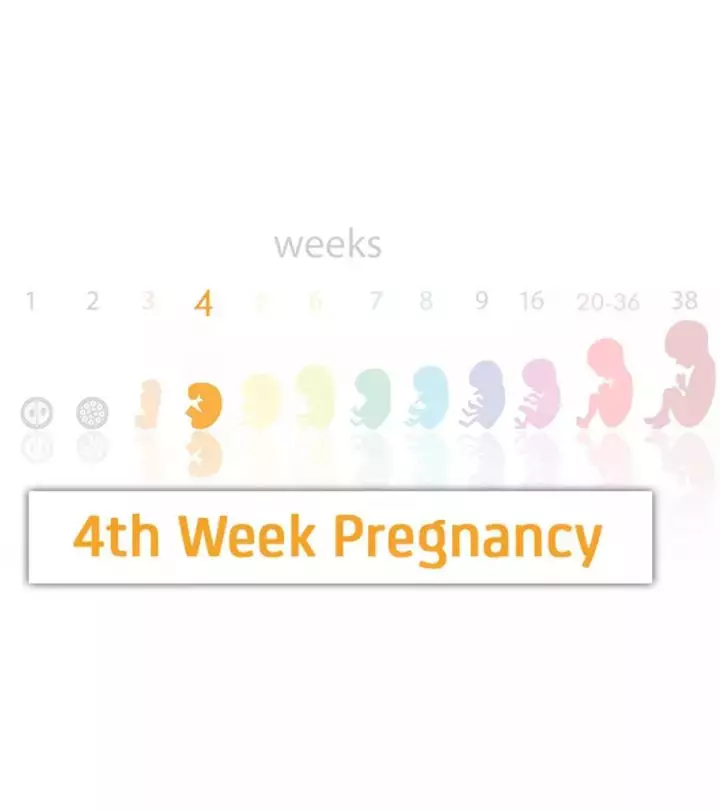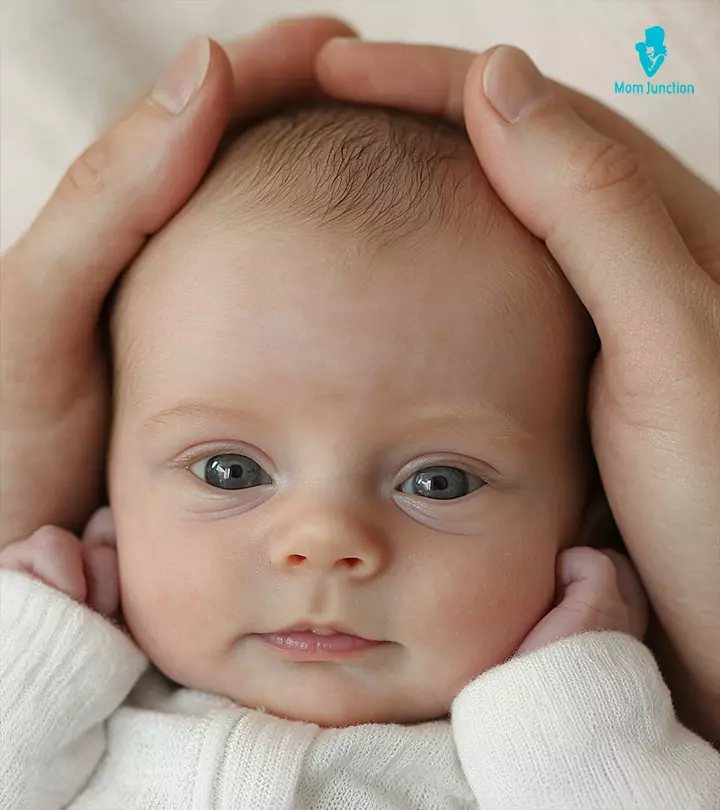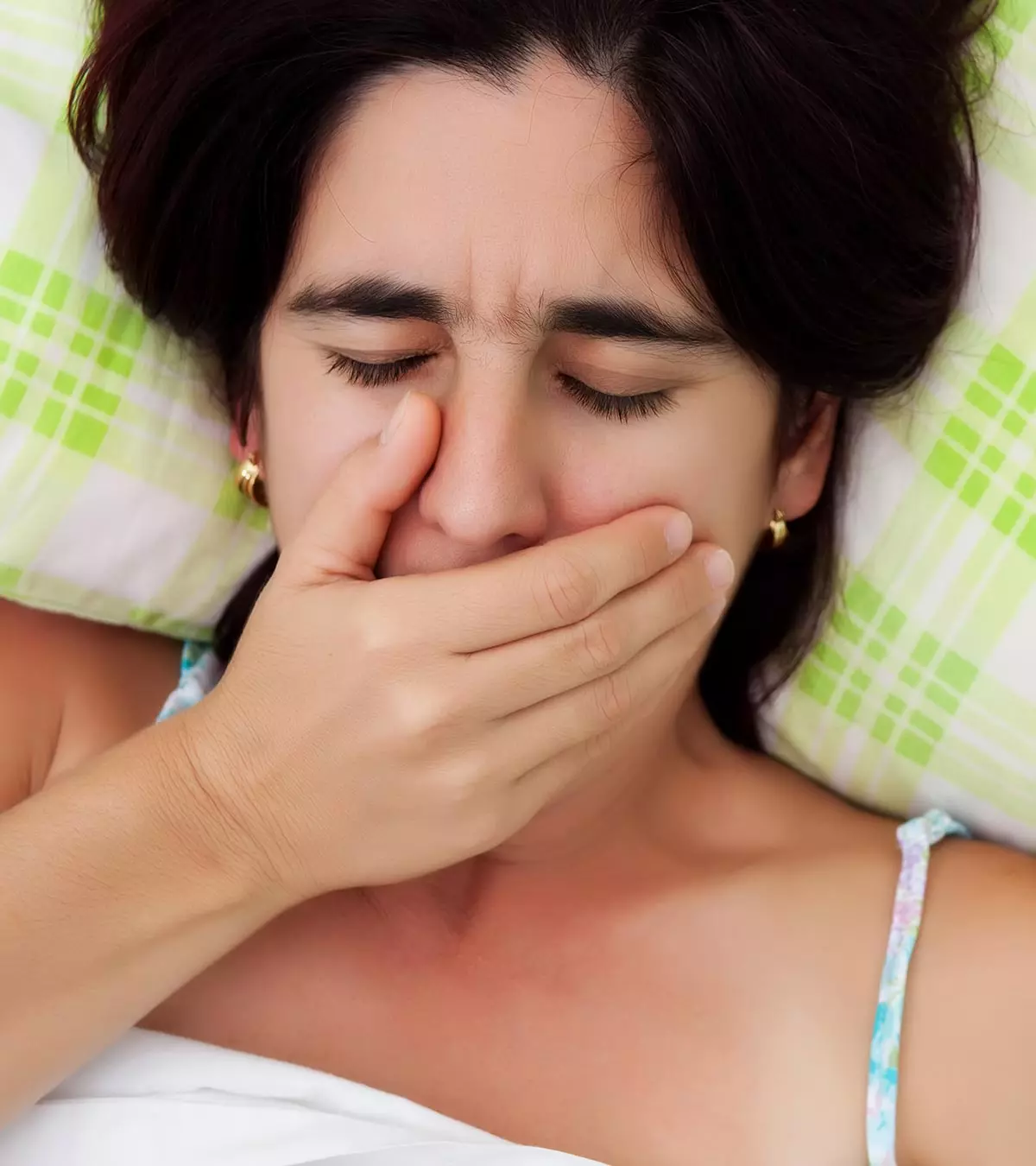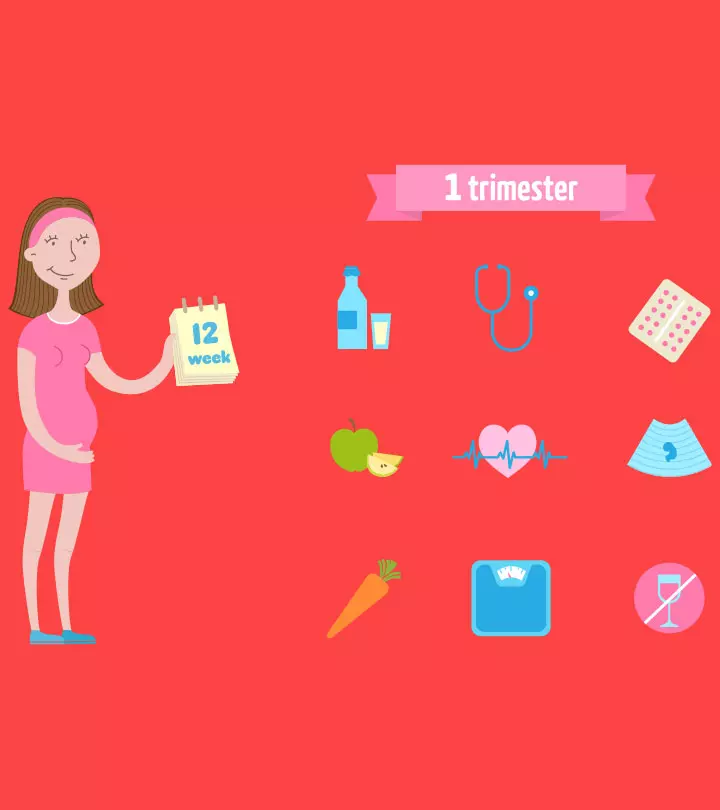
Image: iStock
Dandruff is a common scalp condition, resulting in the scalingiFormation of a thin, dry layer of flaky dead skin cells in the epidermis of the scalp of the skin from the scalp and forming a new skin layer. Although natural, dandruff during pregnancy could be aggravated by fungal infections and hormonal changes. It could also result from certain hair products, and following some precautions could help prevent dandruff (1) (2). The condition is treatable and manageable when you follow the right measures
Learn about the causes, treatment management, and preventive measures of dandruff in pregnancy.
Key Pointers
- Factors such as increased oil production, accumulation of bile, and hormonal fluctuations may result in dandruff during pregnancy.
- It is harmless and can be treated with certain ointments, antifungal medications, and shampoos after consulting with your doctor.
- You may try different effective home remedies or preventive measures for a natural approach.
How Common Is Dandruff During Pregnancy?
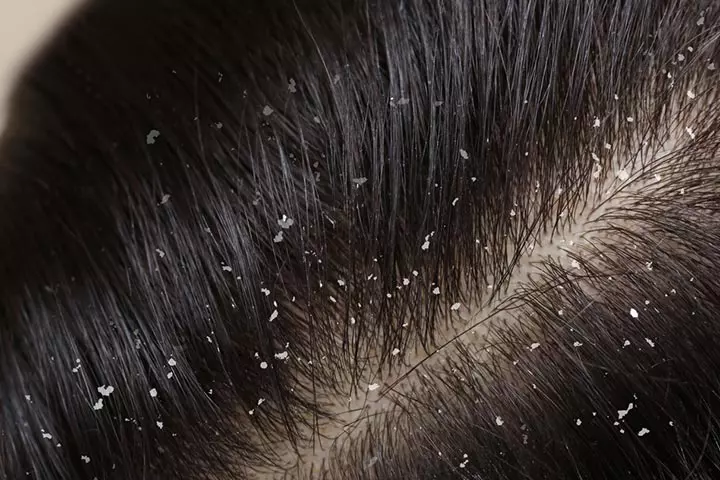
Dandruff is a hair and scalp issue, which occurs in response to the changes in hormonal levels during pregnancy (2) (3). The condition is common among pregnant women, and statistics show its prevalence is around 50% of the general population (1). But, there is limited information regarding the prevalence of dandruff during pregnancy.
What Are The Causes Of Dandruff During Pregnancy?
Some possible causes of having dandruff during pregnancy are (1) (3) (4) (5):
- Sensitive scalp: Having a vulnerable scalp easily attracts infections and irritation that follows flaking and dandruff.
- Fungal infection: Fungal infection from fungi, such as Malassezia furfur, may cause dandruff during pregnancy.
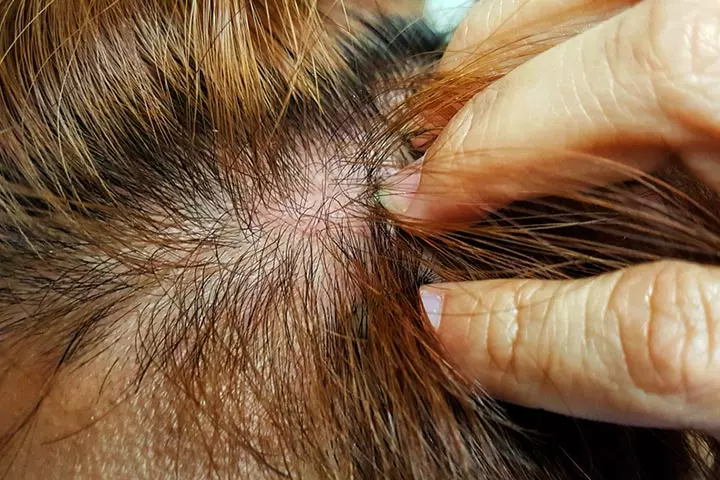
- Accumulation of bile: Dandruff comes with scalp pruritus (itchy skin irritation) that may result from bile acid accumulation in the skin and serum in case of obstetric cholestasisiA serious liver disorder in pregnancy characterized by severe itching in the extremities of the body of pregnancy. The accumulated bile acid may cause the release of inflammatory molecules from the cells, causing an itchy sensation.
- Changes in levels of pregnancy hormones: A reduced hepatic blood flow during pregnancy may be causing sustained levels of hormones and cholesterol in the body. These changes are essential for the microbes to sustain and multiply in the skin, causing dandruff.
- Higher oil production: Pregnancy may be associated with higher oil production in the skin. Having oily skin may attract lipophilic fungiiA group of fungi commonly found in the skin’s sebaceous glands that may cause certain skin conditions such as Malassezia, which could lead to dandruff.
- Use of skin irritant products: Continuous use of skin irritants such as shampoos, oils, and conditioners may continuously irritate the scalp resulting in dryness and dandruff. In addition, there is a lack of evidence about the safety and side effects of various hair care products. Self-medication and trials of various hair care products may increase the risk of fungal infection, dandruff, and hair fall in pregnancy.
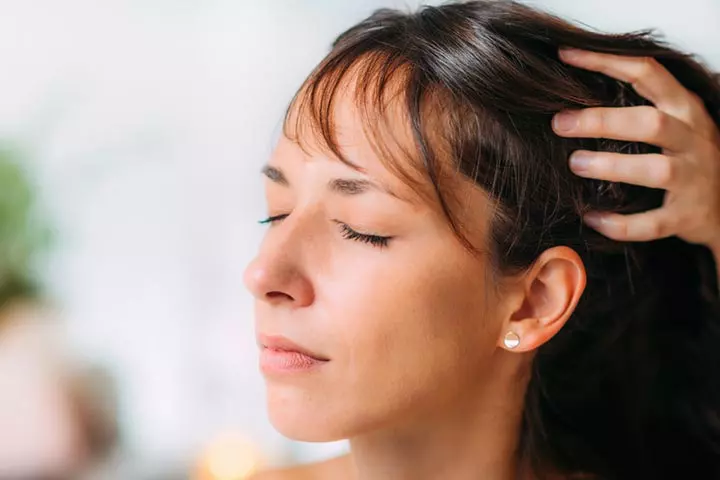
- Chronic metabolic disorder: Metabolic disorders may have a detrimental effect on the sebaceous glands (oil-producing). The abnormal functioning of these glands can contribute to an increase in dandruff.
- Polycystic Ovary Syndrome (PCOS): The World Health Organization claims that Polycystic ovary syndrome affects an estimated 8–13% of reproductive-aged women. According to the Center for Disease Control and Prevention (CDC), women having higher production of male hormones may lead to the formation of cysts (fluid-filled sacs) inside the ovaries. This condition could lead to dandruff.
 Trivia
TriviaHow Is Dandruff During Pregnancy Treated?
If you are planning to use an anti-dandruff shampoo, it would be ideal taking suggestions from a doctor (6) (7) (8):
- Nizoral-containing shampoo is not known to have any harmful effects during pregnancy.
- Topical corticosteroidsiSteroid hormones produced in the adrenal cortex that help alleviate inflammation and the immune system activity are effective against fungal infection of the scalp with rare side effects. They are considered safe to use during pregnancy but should be used when it’s beneficial and as prescribed by a dermatologist.
As every skin is different, there is no one-for-all treatment for dandruff. Check with your doctor before adhering to self-medication (9) (10) (11).
- Antifungal medications include ciclopirox olamine.
- Corticosteroid creams and ointments offer relief from itchiness.
- Antidandruff shampoos include combinations of salicylic acid, sulfur, zinc pyrithione, tar, selenium sulfide, ketoconazole, ciclopirox, and clobetasol.
How To Treat Dandruff Naturally During Pregnancy?
Some of the naturopathic agentsiSubstances derived from natural sources that help prevent or combat specific health ailments you may use to control dandruff and improve scalp health during pregnancy are (12) (13) (14) (15) (16):
- Olive oil: Since ancient times, olive oil has been used for the treatment of skin conditions. It is one of the components in several dandruff treatment products.
- Sage: A hair and scalp massage with sage (Salvia officinalis) extract is beneficial for dandruff and greasy hair from traditional times.
- Rosemary: Rosemary works as a hair conditioner, and it can prevent dandruff and hair loss.
- Thyme: Thyme (Thymus vulgaris) is used to rub the scalp. Combining rosemary with thyme helps maintain healthy hair and scalp.
- Garlic: The lotion of garlic (Allium sativum) is used to control dandruff.
- Walnut: The walnut (Juglans regia) leaves are used as traditional medicine for skin and dandruff treatment. It has a soothing effect on itching.
- Apple cider vinegar: Apple cider vinegar is a natural antifungal agent, and it is known to soothe the scalp and prevent dandruff.
- Aloe vera: Massaging aloe vera extract to the scalp may help prevent scalp irritation and itching due to dandruff.
- Coconut oil: Coconut oil is widely used for healthy skin and hair. It penetrates the hair shaft and nurtures the hair.
- Sea salt: Sea salt mixed with essential oils can be used as a scalp scrub to treat dandruff.
- Tea tree oil: The essential oil distilled from the tea tree (Melaleuca alternifolia) is used for hair and skin care products. It is a well-known antibacterial and antifungal agent. However, there is evidence of allergic reaction on applying to sensitive skin in rare cases.
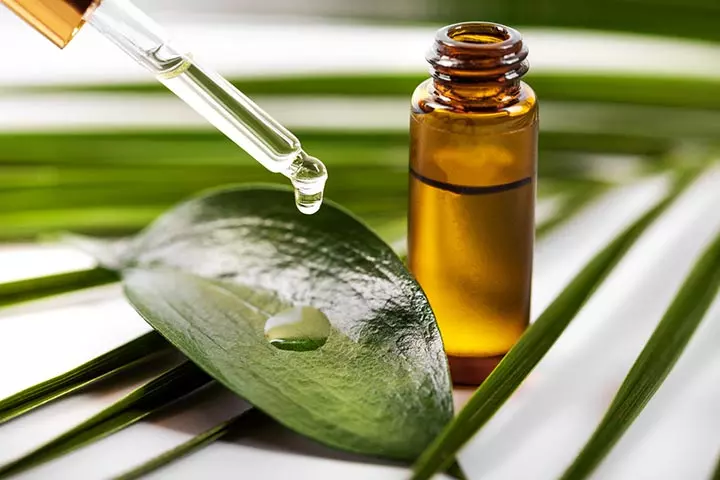
- Fenugreek seeds: The seeds of fenugreek (Trigonella foenum-graeceum) have been widely used to treat severe skin inflammations and dandruff.
- Neem: Neem oil is considered an effective remedy for dandruff and dry scalp. It has antimicrobial properties to promote hair growth.
 Quick fact
Quick factCan You Prevent Dandruff During Pregnancy?
Dandruff is a preventable condition. Some tips to help prevent dandruff while pregnant are (17):
- Manage stress: Most women experience stress during pregnancy. Stress-induced hormonal changes might affect your hair and scalp resulting in dandruff. Find ways to overcome stress and stay calm.
- Eat a balanced diet: A healthy and nutritious diet rich in minerals and vitamins is a prerequisite for healthy hair and scalp.

- Sleep well: Maintaining a regular sleep cycle can help you have good immunity and better skin quality.
- Use hair conditioner: Conditioning your hair after using a shampoo can keep your hair and scalp hydrated and nourished, thereby preventing itchy scalp and dandruff.
Frequently Asked Questions
1. Can dandruff have any effect on the baby during pregnancy?
There is no scientific evidence of dandruff having any negative effect on the growing fetus or causing adverse pregnancy outcomes.
2. Is dandruff during pregnancy more common in any trimester?
Various skin changes may occur as your pregnancy progresses which may not be attributed specifically to any trimester (19). Therefore, pregnancy dandruff is not known to be more common in a particular trimester.
3. Can dandruff during pregnancy be a symptom of a larger health issue?
Dandruff is usually not associated with any serious underlying health condition. It is primarily considered an aesthetic problem (20).
Dandruff during pregnancy is harmless and mainly occurs due to hormonal fluctuations. This common condition can be managed with effective home remedies such as coconut oil, aloe vera, and rosemary applications. But sometimes, it may arise due to infections or other underlying conditions for which you may be prescribed medications and ointments. In either of the situations, the condition is easily manageable and should not be alarming. You may try the preventive tips to avoid dandruff during pregnancy altogether.
Infographic: Ways To Naturally Manage Dandruff During Pregnancy
Certain herbs and oils possess properties that help relieve the symptoms of dandruff. They may be applied on the scalp to get their benefits and are often considered safe during pregnancy. The infographic below lists such naturopathic agents that may help manage dandruff in pregnant women.
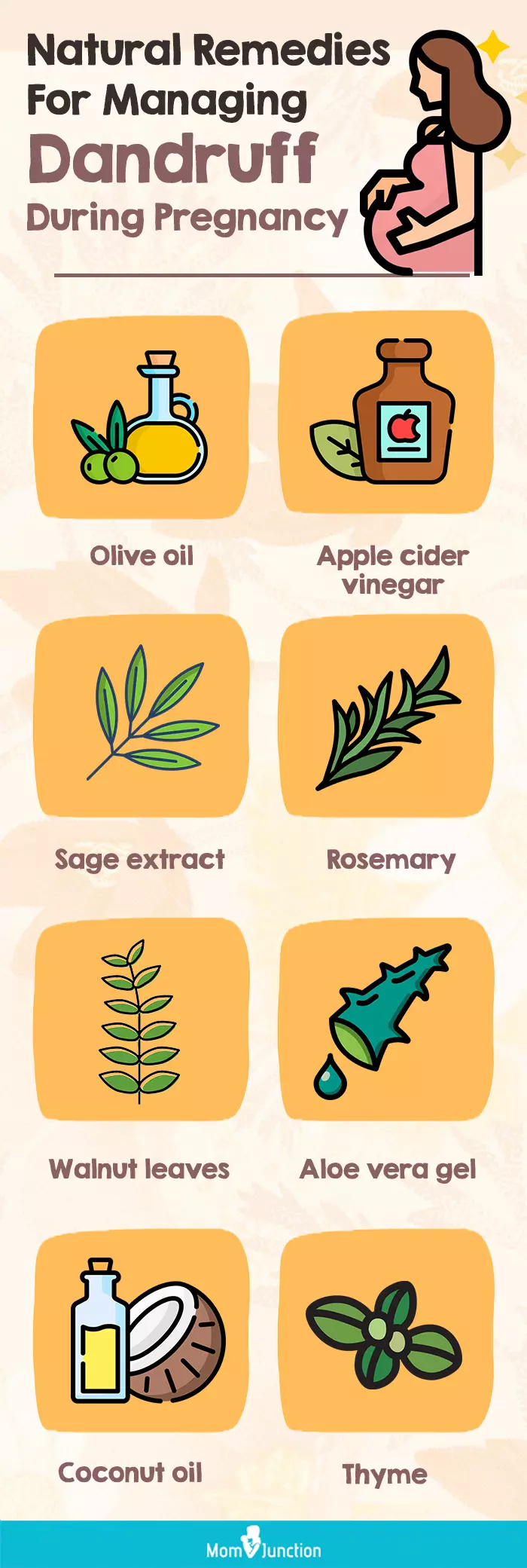
Illustration: Momjunction Design Team
Illustration: Dandruff During Pregnancy: Causes Treatment & Home Remedies

Image: Dall·E/MomJunction Design Team
Do you have an itchy scalp? Learn about the causes, signs, and treatments for dandruff in this informative video.
References
- A New Postulate on Two Stages of Dandruff: A Clinical Perspective.
https://www.ncbi.nlm.nih.gov/pmc/articles/PMC3129121/ - Why do flakes appear on the head? Dandruff: causes, prevention, treatment Dandruff flakes causes and treatment.
https://lasiea.ru/en/pochemu-poyavlyayutsya-hlopya-na-golove-perhot-prichiny-profilaktika-lechenie.html - Clinical study of skin changes in low and high risk pregnant women.
https://www.ncbi.nlm.nih.gov/pmc/articles/PMC4689069/ - Common Reproductive Health Concerns for Women.
https://www.cdc.gov/reproductive-health/women-health/common-concerns.html?CDC_AAref_Val=https://www.cdc.gov/reproductivehealth/womensrh/healthconcerns.html - Polycystic Ovarian Syndrome.
https://www.eatright.org/health/pregnancy/fertility-and-reproduction/polycystic-ovarian-syndrome - Nizoral Antidandruff Shampoo.
https://www.medicines.org.uk/emc/product/6456/smpc#PREGNANCY - Topical anti‐inflammatory agents for seborrhoeic dermatitis of the face or scalp.
https://www.ncbi.nlm.nih.gov/pmc/articles/PMC6483543/ - Topical corticosteroids.
https://www.nhs.uk/conditions/topical-steroids/ - DANDRUFF: THE MOST COMMERCIALLY EXPLOITED SKIN DISEASE.
https://www.ncbi.nlm.nih.gov/pmc/articles/PMC2887514/ - Changes in fungal ultrastructure after short-course ciclopiroxolamine therapy in pityriasis versicolor.
https://onlinelibrary.wiley.com/doi/abs/10.1111/j.1365-2230.1990.tb02040.x?sid=nlm%3Apubmed - What is the best way to treat severe dandruff?
https://www.health.harvard.edu/skin-and-hair/what-is-the-best-way-to-treat-severe-dandruff - Plants used in cosmetics.
https://onlinelibrary.wiley.com/doi/10.1002/ptr.1363 - Herbal Hair Cosmetics – An Overview.
https://lightlabla.com/ - How to Use Apple Cider Vinegar for Hair Care: Benefits and Hair Rinse Guide.
https://utopia.org/guide/apple-cider-vinegar-for-hair/ - Home Remedies for Dandruff.
https://jamaicahospital.org/newsletter/home-remedies-for-dandruff/ - Get a more effective scalp exfoliating treatment with these natural oils.
https://www.naturaloilsforhair.net/2015/11/get-a-more-effective-scalp-exfoliating-treatment-with-these-natural-oils.html - Dandruff and itching scalp.
https://www.betterhealth.vic.gov.au/health/conditionsandtreatments/dandruff-and-itching-scalp - Home Remedies for Dandruff
https://jamaicahospital.org/newsletter/home-remedies-for-dandruff/ - Changes to your skin during pregnancy.
https://www.pregnancybirthbaby.org.au/changes-to-your-skin-during-pregnancy - What is dandruff?
https://uhs.umich.edu/dandruff
Community Experiences
Join the conversation and become a part of our nurturing community! Share your stories, experiences, and insights to connect with fellow parents.
Read full bio of Dr. Richa Hatila Singh
Read full bio of Anshuman Mohapatra
Read full bio of Rebecca Malachi
Read full bio of Dr. Joyani Das







